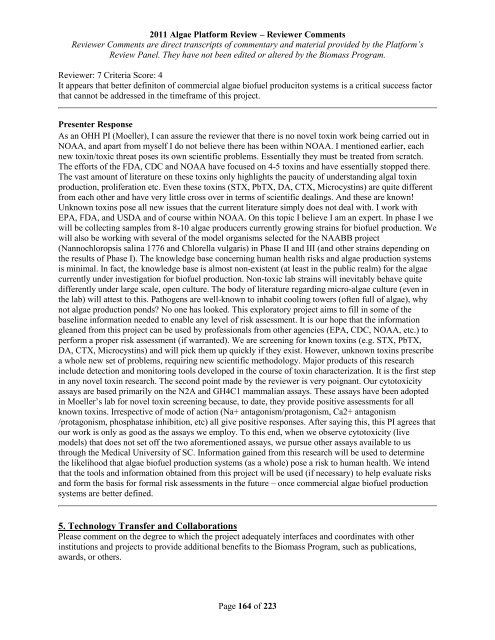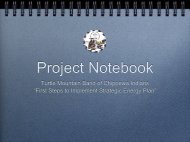Reviewer Comments - EERE
Reviewer Comments - EERE
Reviewer Comments - EERE
Create successful ePaper yourself
Turn your PDF publications into a flip-book with our unique Google optimized e-Paper software.
2011 Algae Platform Review – <strong>Reviewer</strong> <strong>Comments</strong><br />
<strong>Reviewer</strong> <strong>Comments</strong> are direct transcripts of commentary and material provided by the Platform’s<br />
Review Panel. They have not been edited or altered by the Biomass Program.<br />
<strong>Reviewer</strong>: 7 Criteria Score: 4<br />
It appears that better definiton of commercial algae biofuel produciton systems is a critical success factor<br />
that cannot be addressed in the timeframe of this project.<br />
Presenter Response<br />
As an OHH PI (Moeller), I can assure the reviewer that there is no novel toxin work being carried out in<br />
NOAA, and apart from myself I do not believe there has been within NOAA. I mentioned earlier, each<br />
new toxin/toxic threat poses its own scientific problems. Essentially they must be treated from scratch.<br />
The efforts of the FDA, CDC and NOAA have focused on 4-5 toxins and have essentially stopped there.<br />
The vast amount of literature on these toxins only highlights the paucity of understanding algal toxin<br />
production, proliferation etc. Even these toxins (STX, PbTX, DA, CTX, Microcystins) are quite different<br />
from each other and have very little cross over in terms of scientific dealings. And these are known!<br />
Unknown toxins pose all new issues that the current literature simply does not deal with. I work with<br />
EPA, FDA, and USDA and of course within NOAA. On this topic I believe I am an expert. In phase I we<br />
will be collecting samples from 8-10 algae producers currently growing strains for biofuel production. We<br />
will also be working with several of the model organisms selected for the NAABB project<br />
(Nannochloropsis salina 1776 and Chlorella vulgaris) in Phase II and III (and other strains depending on<br />
the results of Phase I). The knowledge base concerning human health risks and algae production systems<br />
is minimal. In fact, the knowledge base is almost non-existent (at least in the public realm) for the algae<br />
currently under investigation for biofuel production. Non-toxic lab strains will inevitably behave quite<br />
differently under large scale, open culture. The body of literature regarding micro-algae culture (even in<br />
the lab) will attest to this. Pathogens are well-known to inhabit cooling towers (often full of algae), why<br />
not algae production ponds? No one has looked. This exploratory project aims to fill in some of the<br />
baseline information needed to enable any level of risk assessment. It is our hope that the information<br />
gleaned from this project can be used by professionals from other agencies (EPA, CDC, NOAA, etc.) to<br />
perform a proper risk assessment (if warranted). We are screening for known toxins (e.g. STX, PbTX,<br />
DA, CTX, Microcystins) and will pick them up quickly if they exist. However, unknown toxins prescribe<br />
a whole new set of problems, requiring new scientific methodology. Major products of this research<br />
include detection and monitoring tools developed in the course of toxin characterization. It is the first step<br />
in any novel toxin research. The second point made by the reviewer is very poignant. Our cytotoxicity<br />
assays are based primarily on the N2A and GH4C1 mammalian assays. These assays have been adopted<br />
in Moeller’s lab for novel toxin screening because, to date, they provide positive assessments for all<br />
known toxins. Irrespective of mode of action (Na+ antagonism/protagonism, Ca2+ antagonism<br />
/protagonism, phosphatase inhibition, etc) all give positive responses. After saying this, this PI agrees that<br />
our work is only as good as the assays we employ. To this end, when we observe cytotoxicity (live<br />
models) that does not set off the two aforementioned assays, we pursue other assays available to us<br />
through the Medical University of SC. Information gained from this research will be used to determine<br />
the likelihood that algae biofuel production systems (as a whole) pose a risk to human health. We intend<br />
that the tools and information obtained from this project will be used (if necessary) to help evaluate risks<br />
and form the basis for formal risk assessments in the future – once commercial algae biofuel production<br />
systems are better defined.<br />
5. Technology Transfer and Collaborations<br />
Please comment on the degree to which the project adequately interfaces and coordinates with other<br />
institutions and projects to provide additional benefits to the Biomass Program, such as publications,<br />
awards, or others.<br />
Page 164 of 223




